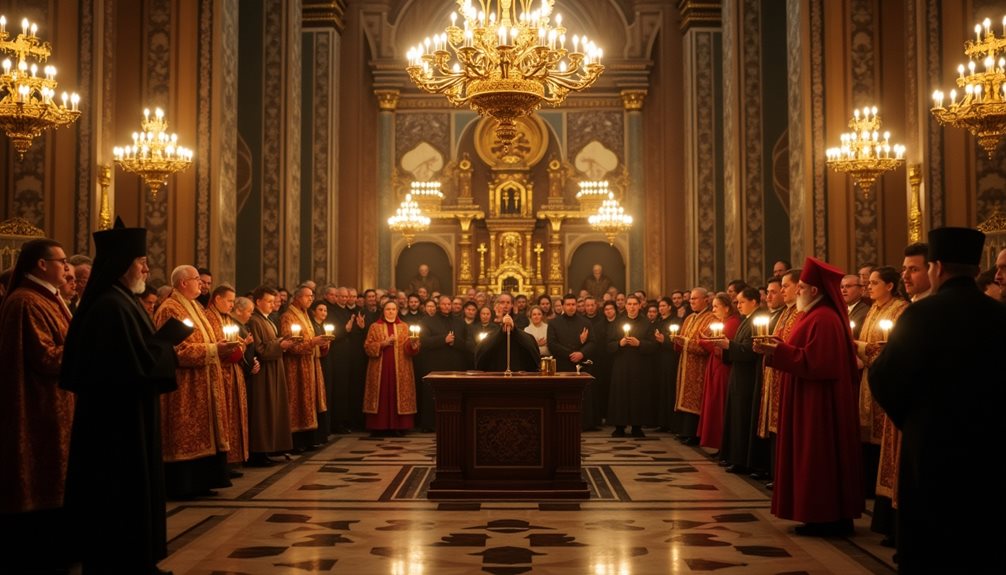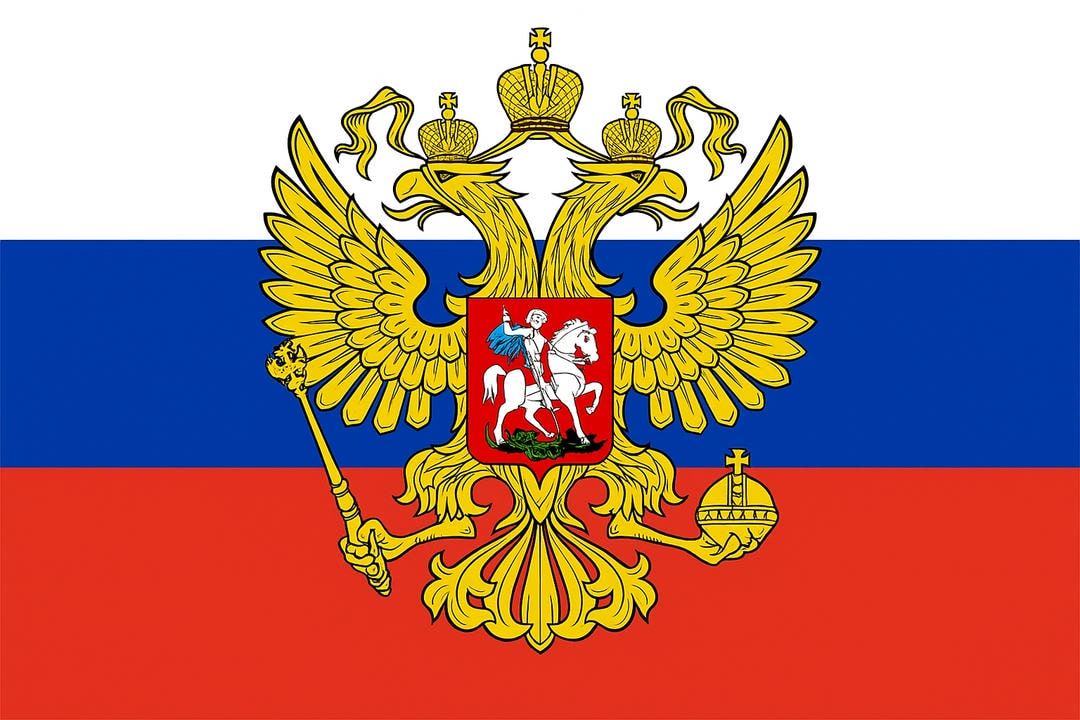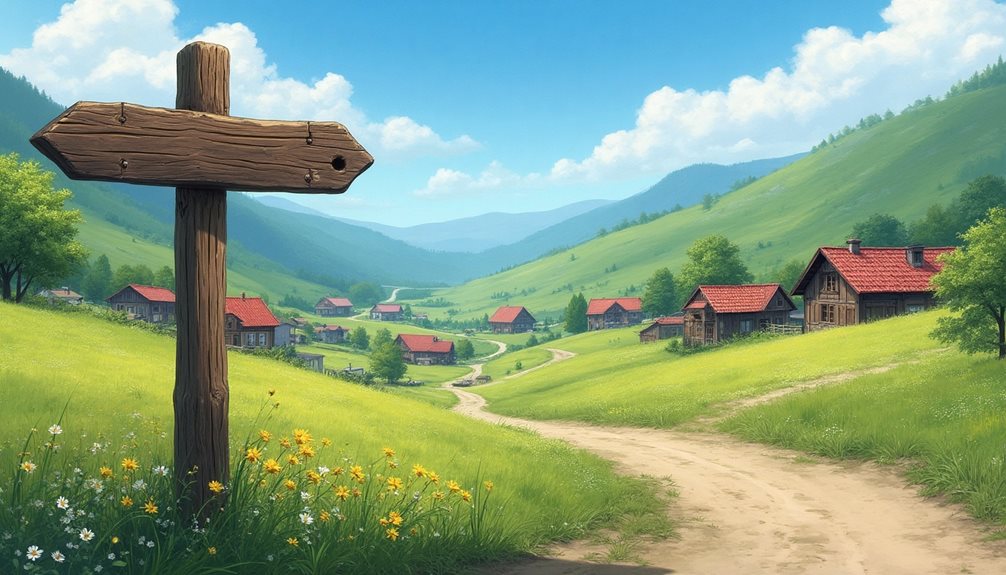July in Russia features a distinctive blend of cultural, professional, and religious holidays that illuminate various facets of national identity. From the Day of Family, Love and Fidelity to ancient Slavic celebrations like Kupala Night, these observances reveal the interplay between tradition and modern societal values. Understanding the significance and rituals of these holidays provides insight into how Russians connect with their heritage and community during this summer month.
Summer Joys in Russia: Community, Culture, and the Heart of July
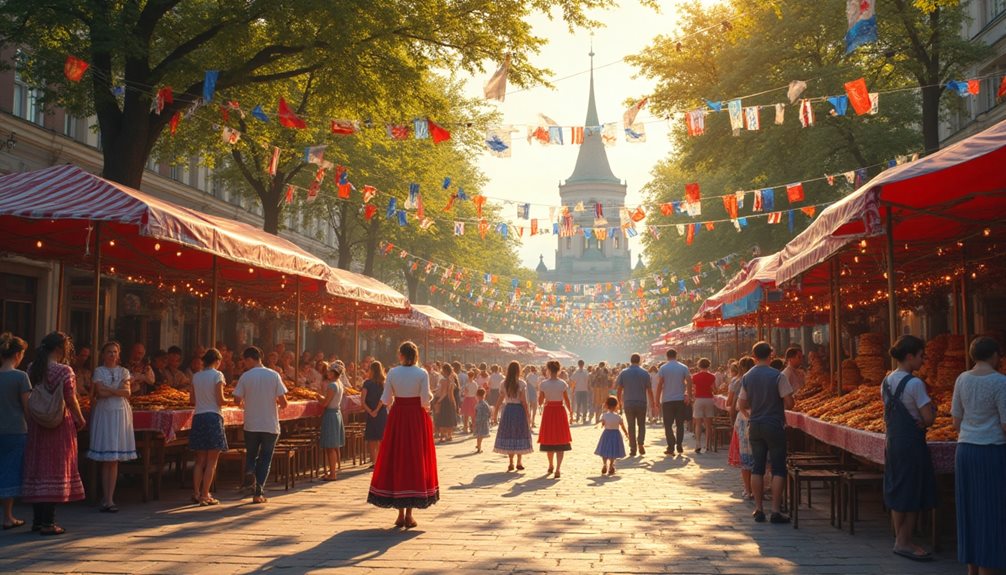
July in Russia is a season of warmth, light, and lively togetherness. While the month doesn’t boast official nationwide holidays, it pulses with the energy of local festivals, cherished traditions, and heartfelt gatherings. In every corner of the country—from bustling cities to quiet villages—people celebrate the richness of their culture, history, and the simple pleasures of summer.
The Russian Calendar: More Than Just Dates
Russia’s calendar weaves together layers of history, faith, and community pride. National observances mark moments of triumph and transformation, reminding the nation of resilience and unity. Religious holidays, especially those rooted in the Russian Orthodox Church, link today’s society with centuries-old rituals and beliefs. Meanwhile, professional holidays salute the dedication of workers in every field, highlighting the essential roles that keep communities thriving.
But July stands apart—not for grand declarations or state holidays, but for its grassroots celebrations that reveal the true spirit of Russian life.
July’s Vibrant Tapestry: Local Festivals and Shared Traditions
Long days and gentle evenings set the stage for a variety of joyful summer events throughout Russia in July. Towns and villages come alive with music, laughter, and the aromas of home-cooked food as neighbors gather to honor their shared heritage.
Community Festivals
Across the country, local festivals fill July’s calendar. Folk music concerts, outdoor dances, and bustling craft markets bring people together in celebration. In rural areas, harvest festivals honor the land’s bounty—fields full of ripening grain and gardens brimming with fresh produce. These gatherings are more than entertainment; they’re opportunities for generations to connect, share stories, and pass on cherished customs.
Ancient Traditions: Kupala Night
One of July’s most captivating celebrations is Kupala Night—a Slavic festival with roots stretching back to pagan times. Celebrated around the summer solstice, this vibrant holiday features bonfires, singing, traditional games, and rituals meant to ensure health and happiness. Young people weave flower crowns and leap over flames, while communities revel in the magic of midsummer.
Religious Observances
The Russian Orthodox Church marks several important dates in July. The feast day of Saints Peter and Paul on July 12 is widely observed with special church services and family gatherings. Throughout the month, many communities hold processions or host celebrations honoring local patron saints—an enduring blend of faith and folk tradition that unites neighbors in prayer and joy.
Honoring Professions
Professional holidays in July highlight the value placed on service and expertise. For example, Medical Workers’ Day (often observed in late June or early July) recognizes doctors, nurses, and healthcare staff for their vital contributions. These acknowledgments foster respect for hard work and underscore the spirit of cooperation at the heart of Russian society.
The Flavors of Summer: Food as Celebration
Food is a central part of July’s festivities. Russian summer cuisine bursts with freshness: crisp cucumbers, sun-ripened tomatoes, wild berries, fragrant herbs, and mushrooms gathered from nearby forests. Dishes like okroshka (a refreshing cold soup), shashlik (grilled meat skewers), berry-filled pies, and homemade preserves are staples at family tables and community feasts. Sharing meals isn’t just about nourishment—it’s an expression of hospitality and togetherness that defines Russian celebrations.
Why July Matters: Community Identity and Living Heritage
Though it lacks official public holidays, July is a month when Russia’s living heritage shines brightest. The traditions kept alive—through music, dance, food, faith, and fellowship—are not relics of the past but vibrant parts of daily life. These rituals nurture a sense of identity and belonging that passes from one generation to the next.
For visitors or anyone curious about Russian culture, experiencing these summertime gatherings offers a window into the country’s soul: a place where history is honored not just in monuments or museums but in every shared laugh, song, and meal.
In Essence: The Heartbeat of Russian Summer
July in Russia is a celebration that radiates from the grassroots up. It’s a time for neighbors to reconnect, families to gather under open skies, and communities to affirm what matters most—friendship, tradition, gratitude for nature’s gifts, and the simple beauty of coming together.
As fields bloom and city parks fill with laughter, Russia’s summer spirit offers something universal: a reminder that joy is often found not in grand occasions but in everyday acts of connection and celebration.
 Major July Holidays in Russia
Major July Holidays in Russia
Several notable holidays in July hold particular cultural and historical significance within Russia, despite the absence of nationwide public holidays during this month. These include commemorations such as the Day of the Baptism of Rus’ and professional observances like Navy Day.
July rituals often intertwine religious reverence with patriotic pride, reflecting Russia’s layered identity. Summer festivities emphasize outdoor gatherings, folk traditions, and communal engagement, reinforcing social cohesion.
While not officially public holidays, these events permeate public consciousness, illustrating how July serves as a period rich in symbolic observance and cultural continuity across diverse Russian communities.
Day of Family, Love and Fidelity (July 8)
The celebration of family values occupies a distinct place in Russia’s cultural calendar with the observance of the Day of Family, Love and Fidelity on July 8.
This holiday emphasizes the importance of enduring family traditions as the foundation of social stability. Love symbols, such as the white daisy, play a central role, representing purity and fidelity.
The day encourages reflection on the bonds that unite families and highlights mutual respect and emotional connection. By focusing on these themes, the observance reinforces cultural ideals about the sanctity of family life within the broader Russian societal context.
History and Traditions
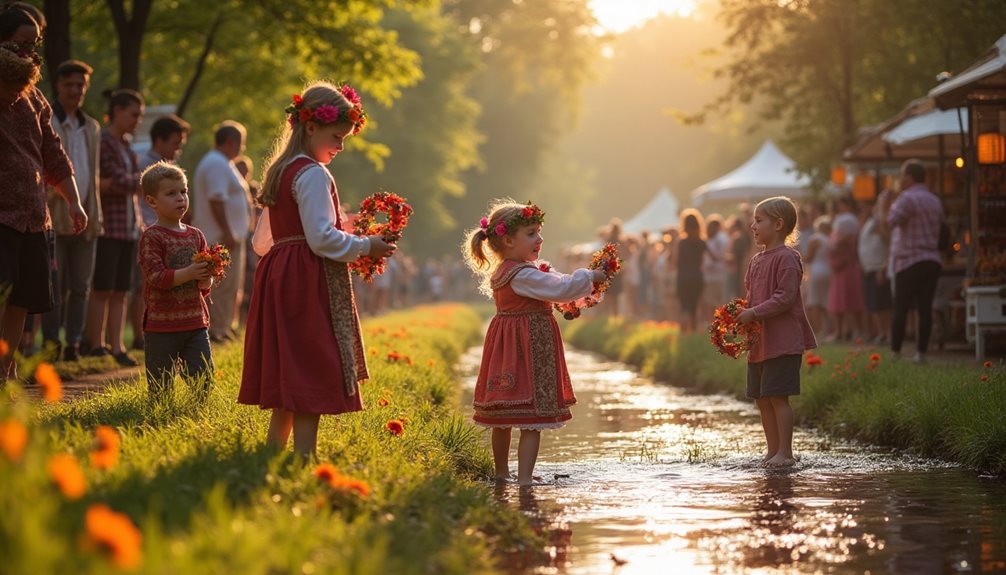
July in Russia is a vibrant tapestry of history, culture, and tradition. While the month may not feature a single, unifying national holiday, it is alive with countless local festivals and cherished customs that bring communities together and celebrate the best of Russian spirit.
Many of these traditions have roots in folklore and age-old agrarian cycles, marking the height of summer with joyful gatherings, music, and dance. People come together in villages and cities alike to honor the land’s abundance, sharing in rituals that have been passed down through generations. These festivities are often tied to Orthodox saints’ days or seasonal milestones, blending spiritual meaning with everyday life and creating a unique sense of belonging.
July is also a time when Russia’s remarkable regional diversity shines. From the lush forests of Karelia to the rolling fields of the Volga, each area adds its own flavor to the celebrations—singing folk songs in native dialects, preparing traditional foods, and weaving stories that connect young and old. These traditions are more than just echoes of the past; they are living practices that nurture community bonds and national pride.
In every corner of Russia, July’s customs remind people of their shared heritage and the joys of coming together. Through vibrant festivals, heartfelt rituals, and simple acts of kindness, Russians embrace the warmth and promise of summer, celebrating both where they come from and where they are going.
Modern celebrations
While July lacks a single, unifying holiday in Russia, contemporary celebrations during this month reveal evolving social dynamics and the interplay between tradition and modernity.
Modern celebrations often blend historical customs with new forms of expression, reflecting shifting cultural significance. Urban centers host festivals emphasizing arts, music, and community engagement, illustrating Russia’s adaptation to global cultural trends.
Additionally, professional and local observances highlight societal values, fostering communal identity without overarching national symbolism. These modern celebrations offer insight into how Russians negotiate heritage and innovation, maintaining cultural continuity while embracing contemporary social practices during July.
Kupala Night (July 6–7)
Since it marks a crucial moment in the midsummer calendar, Kupala Night (July 6–7) serves as a significant cultural event rooted in ancient Slavic traditions.
Celebrated with rituals reflecting the harmony of nature and human life, Kupala night traditions emphasize fire, water, and fertility symbols. Participants engage in bonfire jumping, wreath floating on rivers, and communal singing, all gestures tied to purification and fortune.
Embedded within Slavic folklore, these practices reveal a profound connection to seasonal cycles and communal identity.
Because Kupala Night is deeply embedded in Slavic heritage, its origins intertwine with ancient pagan rituals that predate Christianity’s spread in the region.
Rooted in agrarian cycles, the festival’s cultural origins emphasize the summer solstice’s life-giving forces. Folklore significance centers on purification, fertility, and the interplay of fire and water as symbolic elements.
Myths surrounding Kupala Night reveal a syncretism of pagan and later Christian motifs, illustrating evolving cultural narratives. This blend underscores the holiday’s resilience and adaptability, preserving Slavic ancestral identity while reflecting broader historical transformations within Eastern European spiritual traditions.
Although Kupala Night has ancient origins, its contemporary celebrations have evolved to incorporate both traditional rituals and modern communal activities.
Today, participants engage in singing, dancing around bonfires, and weaving flower crowns, reflecting the event’s enduring cultural significance. These activities occur within broader summer festivals that emphasize community bonding and a connection to nature.
Public gatherings often blend folkloric performances with contemporary entertainment, illustrating the dynamic adaptation of this holiday. By preserving symbolic practices while embracing new forms of celebration, Kupala Night remains a vibrant expression of Russian heritage and the seasonal rhythms that shape communal life.
Day of the Baptism of Rus’ (July 28)
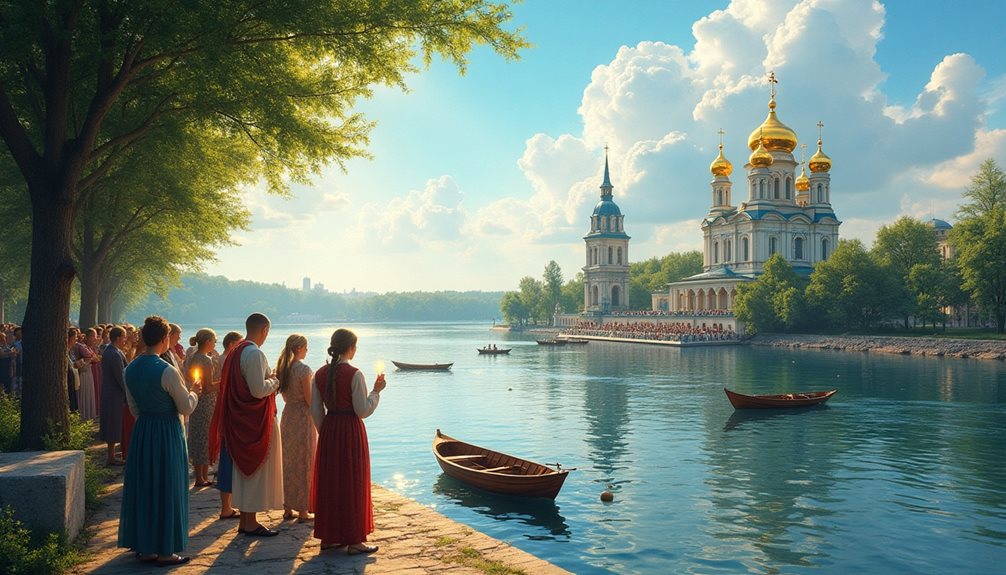
Marked each year on July 28, the Day of the Baptism of Rus’ commemorates one of the most consequential moments in Eastern European history: the official adoption of Christianity by Kievan Rus’ under Prince Vladimir the Great in 988 CE. This turning point not only transformed the spiritual life of the region but also set the course for its cultural and political development.
Before 988, Kievan Rus’ was a patchwork of Slavic tribes practicing a variety of pagan beliefs. Prince Vladimir’s decision to convert to Christianity—and to make it the state religion—was both a religious and a strategic act. Influenced by his grandmother, Princess Olga (the first Christian ruler of Rus’), and seeking to align more closely with the powerful Byzantine Empire, Vladimir saw Christianity as a unifying force for his people and a means to strengthen his realm’s international standing.
The mass baptism took place in Kyiv, with legend describing how Vladimir ordered the city’s residents to gather at the Dnieper River for a communal rite led by Byzantine clergy. This act symbolized not only a personal conversion but also a collective embrace of a new faith. The adoption of Orthodox Christianity provided a common spiritual foundation, helping to knit together previously disparate tribes and regions.
Lasting Influence on Culture and Society
The effects of this event rippled far beyond religion:
- Art and Architecture: The Slavic adoption of Orthodox Christianity inspired the construction of magnificent churches with distinctive domes, as well as icons and frescoes that became hallmarks of Russian religious art.
- Law and Governance: Byzantine legal concepts found their way into local codes, influencing governance and justice.
- Literacy and Education: The spread of Christianity brought literacy in Old Church Slavonic and fostered the development of literature and learning.
The alignment with Byzantium also opened new avenues for trade, diplomacy, and cultural exchange, further embedding Kievan Rus’ into the broader European world.
Shaping Russian Identity
The Baptism of Rus’ is often seen as the cornerstone of Russian Orthodox identity. It laid the groundwork for the development of the Russian Church, which would later play a central role in national life—both spiritually and politically. For centuries, Russian rulers traced their legitimacy back to Vladimir’s fateful choice.
Commemoration and Modern Observance
Today, the Day of the Baptism of Rus’ is marked by church services, processions, and public events across Russia, Ukraine, and Belarus. It serves as a day of reflection on national unity, spiritual heritage, and historical continuity.
July is notable for other important Orthodox feast days as well. For example, the Feast of the Holy Apostles Peter and Paul on July 12 honors two foundational figures in Christian tradition. Such observances reinforce communal bonds and spiritual identity within the Orthodox world.
Russia’s religious calendar also reflects its diversity. Minority communities—Muslims, Jews, Buddhists, and others—observe their own significant holidays throughout the year, contributing to a rich tapestry of faith traditions.
The Day of the Baptism of Rus’ is not just a religious anniversary; it marks a far-reaching transformation that helped shape Russian civilization. By embracing Christianity in 988, Prince Vladimir forged a unified cultural and spiritual path that continues to resonate in modern society, making July 28 a day rich with historical memory and contemporary significance.
Professional and Cultural Observances
Professional and cultural observances in Russia during July reflect the nation’s recognition of diverse occupations and artistic heritage.
These observances hold cultural significance by honoring professions that contribute to societal development, reinforcing pride and identity within various communities. By acknowledging roles in agriculture, education, and the arts, Russia emphasizes the professional impact of these sectors on national progress.
Cultural festivals and commemorative days provide platforms for public engagement, preserving traditions while promoting contemporary cultural expressions. Such observances underscore the interplay between professional dedication and cultural continuity, illustrating how occupational recognition shapes Russia’s social and cultural landscape in midsummer.
Day of Sea and River Fleet Workers (First Sunday)
Among the various professions celebrated in July, those connected to maritime and inland waterway transportation receive particular acknowledgment.
The Day of Sea and River Fleet Workers, observed on the first Sunday of July, honors individuals sustaining Russia’s extensive maritime traditions and essential waterborne logistics. This observance highlights the economic and cultural importance of river and sea fleets in connecting regions and facilitating trade.
Summer festivals often accompany the day, featuring ceremonies and public events that emphasize the sector’s heritage and ongoing relevance. The day reinforces collective recognition of professionals who navigate Russia’s vast waterways, integrating historical pride with contemporary challenges.
Day of the Russian Postal Service (Second Sunday)
Although the Russian postal service has undergone significant modernization in recent decades, its historical role as an essential communication network remains deeply ingrained in national consciousness.
Celebrated on the second Sunday of July, the Day of the Russian Postal Service honors the institution’s enduring service significance, tracing back through a rich postal history that facilitated connectivity across vast territories.
This observance highlights both the evolution of mail delivery and the cultural importance of communication in Russia’s development.
The holiday recognizes postal workers’ contributions, reinforcing the service’s role as a crucial link in social and economic structures despite technological advances.
System Administrator Day (Last Friday)
Why does the Russian calendar reserve a special day for system administrators on the last Friday of July?
This observance acknowledges the crucial role these professionals play in maintaining system security and ensuring uninterrupted network optimization across organizations.
System administrators manage complex IT infrastructures, safeguard data integrity, and optimize network performance, which are essential for modern enterprises’ stability and efficiency.
Celebrating their work highlights the increasing reliance on digital frameworks in Russia’s economic and social sectors.
Other Notable Professional Days
Several professional observances in July highlight Russia’s recognition of specialized contributions across diverse fields.
These include celebrations such as Medical Worker’s Day and Railway Workers’ Day, each underscoring the cultural significance of professions essential to society’s functioning. Such days foster professional pride, reinforcing a collective identity among practitioners while acknowledging their societal roles.
Importantly, these observances serve not only as expressions of gratitude but also as opportunities to reflect on historical developments within each profession. By institutionalizing these professional days, Russia emphasizes the value of expertise and dedication, promoting respect and continuity within its varied occupational communities.
Folk and Unofficial Celebrations
Beyond formal professional observances, July in Russia is marked by a variety of folk and unofficial celebrations that reveal the country’s rich cultural fabric.
These gatherings often center on folk customs rooted in agrarian and communal life, reflecting historical rhythms tied to the summer season.
Summer festivities include traditional music, dance, and communal meals, fostering social cohesion and cultural continuity.
While lacking official status, these events sustain regional identities and collective memory, illustrating how grassroots cultural expressions complement formal holidays.
Such folk celebrations highlight the enduring importance of seasonal cycles and local traditions within Russia’s diverse societal landscape.
Neptune Day (Last Sunday)
Neptune Day, celebrated on the last Sunday of July, is a distinctive festivity that blends maritime themes with communal revelry across various Russian regions.
Rooted in Neptune mythology, the holiday honors the Roman god of the sea, symbolizing humanity’s connection to marine environments.
Traditionally marked by water-based activities and theatrical rituals, the event fosters awareness of marine conservation challenges.
Participants engage in symbolic ceremonies to respect aquatic ecosystems, emphasizing the importance of protecting Russia’s waterways.
Neptune Day consequently serves both as cultural homage and an educational platform promoting sustainable interaction with Russia’s diverse aquatic habitats.
Day of the Skydiver (July 26)
Commemoration of courage and precision defines the Day of the Skydiver, observed annually on July 26 in Russia. This day honors the nation’s skydiving culture, reflecting both military heritage and civilian enthusiasm for extreme sports.
It highlights the rigorous training, technical skill, and mental discipline required in skydiving, underscoring the sport’s demanding nature. Events often include demonstrations and competitions that showcase parachuting techniques and advancements in equipment.
 International Day of Cooperatives (First Saturday)
International Day of Cooperatives (First Saturday)
Although not a widely recognized public holiday, the International Day of Cooperatives, observed on the first Saturday of July, holds significant socio-economic importance in Russia.
This day highlights the historical and ongoing role of cooperative movements in fostering community resilience and economic participation, especially in rural areas. The cultural significance lies in promoting collaboration, mutual aid, and sustainable development, values deeply embedded in Russian society.
Through events and discussions, the day reinforces awareness of cooperatives as essential actors in social welfare and economic equality, reflecting broader efforts to strengthen collective enterprises within the country’s diverse economic landscape.
International Day of the Tiger (Date varies)
The International Day of the Tiger, observed on varying dates depending on regional and organizational calendars, serves as a critical occasion for raising awareness about tiger conservation efforts globally, including within Russia.
This day highlights the urgent need to protect dwindling tiger populations amid habitat loss and poaching. Through coordinated campaigns, it fosters global awareness of the species’ ecological importance and the challenges they face.
In Russia, where the Siberian tiger is a symbol of biodiversity, the observance reinforces commitments to tiger conservation by promoting scientific research, habitat preservation, and international cooperation to guarantee the survival of this endangered species.
How Russians Celebrate July Holidays
Observances like the International Day of the Tiger exemplify how July in Russia encompasses a variety of meaningful events beyond conventional public holidays.
Russians engage with July traditions through localized and thematic commemorations, often blending cultural reflection with environmental awareness. Summer festivities during this period are marked by community participation, educational programs, and artistic expressions, illustrating Russia’s multifaceted approach to celebration.
While lacking a unified national holiday, these observances reinforce social cohesion and cultural identity. The nuanced ways Russians honor July holidays reveal an appreciation for both historical significance and contemporary relevance within the broader context of summer activities.
Common Traditions and Activities
Frequently, July in Russia is characterized by a blend of outdoor gatherings, cultural performances, and nature-focused activities that reflect both seasonal opportunities and traditional values.
Common traditions include family gatherings, which often center around shared meals and storytelling, reinforcing social bonds.
Summer festivals play an essential role, featuring folk music, dance, and crafts that celebrate regional identities.
Additionally, activities such as hiking, berry picking, and visiting countryside dachas align with the cultural emphasis on nature.
These practices collectively illustrate how Russians engage with July’s warmth, balancing communal celebration with appreciation for heritage and the natural environment.
![]()
July’s Living Legacy: Where Russian Summer Comes Alive
July in Russia is more than just a passage through the heart of summer—it’s a celebration of life, heritage, and community that pulses with energy in every city square and countryside meadow. While the month may not offer grand national holidays, it brims with the spirit of togetherness: in the laughter shared at family tables, the rhythms of folk music drifting through warm evenings, and the timeless rituals celebrated under open skies.
From ancient festivals like Kupala Night to modern professional observances and heartfelt family days, July weaves together old and new, blending tradition with innovation. These celebrations aren’t just events on a calendar—they’re living expressions of Russian resilience, unity, and gratitude for the season’s gifts.
In every gathering, dance, and shared meal, July reminds Russians—and those who experience their culture—of the true richness found in connection and continuity. This is the heartbeat of Russian summer: a vibrant legacy that endures, inspires, and brings people together year after year.


